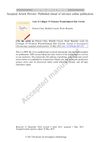CYLD Cutaneous Syndrome Tumors Demonstrate Increased NF-kB Signaling and Diminished Collagen Organization

TLDR Skin tumors with CYLD cutaneous syndrome show more NF-κB activity and less organized collagen.
The study investigated the effects of CYLD cutaneous syndrome (CCS) on protein expression in skin tumors, using proteomics to analyze 8 CCS tumor samples and control skin. The analysis identified significant changes in 139 proteins, with a particular increase in nuclear factor-κB (NF-κB) and immune signaling proteins, as well as spliceosome proteins in tumor samples. Additionally, there was an upregulation of certain extracellular matrix (ECM) proteins like collagen 7, collagen 4, agrin, and thrombospondin-1 in tumors. However, proteins related to collagen organization and fibril formation were less abundant in CCS tumors compared to normal skin. Immunoblotting showed a decrease in collagen I and an increase in collagen VII in tumor samples. These findings suggest that the loss of CYLD function leads to altered NF-κB signaling and an abnormal secretion of specific ECM proteins in CCS tumors.

